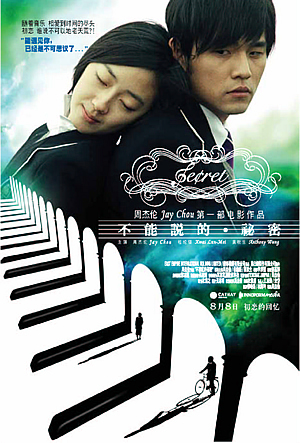DIDI'S DREAMS ("吃吃"的爱) (2017)
Genre: Comedy/Romance/Fantasy
Director: Kevin Tsai
Cast: Dee Hsu, Lin Chi Ling, Jin Shi Jia, Li Zi Feng
Runtime: 1 hr 31 mins
Rating: PG
Released By: Shaw
Official Website:
Opening Day: 8 June 2017
Synopsis: Didi is an actress who wishes to prove herself before her superstar sister, while Chun Mei owns a noodle shop in space and is dumped by the boy she has fancied for a long time. When these two lives cross paths, where will fate take them?
Movie Review:
“I will prove to all of you – a ‘clown’ can be a good actress too!” So declares the tenacious character of Shangguan Didi in one of the film’s standout lines, a proclamation that seems to perfectly encapsulate the latest real-life aspirations of host-turned-actress Dee Hsu, who portrays the lead role in question. Written and directed by Kevin Tsai, Didi’s Dreams has been a long time coming for fans of the now-defunct Taiwanese talk show Mr Con and Ms Hsi that was hosted by Tsai and Hsu. Naturally, expectations run high, considering that the celebrity duo pulled the plug on the beloved comedy-variety series in order to embark on unchartered filmmaking territory, not to mention the fact that this reviewer used to be a huge fan of the TV programme.
Tsai appears to pull out all the stops in crafting a string of situations and personas in the film for Hsu that run the gamut – surely a calculated move to demonstrate the breadth of her acting skills. From comedy to tragedy, romance to familial ties, period pieces to futuristic setups, the cinematic universe created by the first-time director here is an ambitious pastiche of, well, just about a little of everything. Sparsely narrated by Tsai, much of the first half of the film features Didi as a struggling actress who, while waiting for her big break, indefatigably endures an endless medley of gruelling auditions, calefare roles and variety programmes. Supported by her unwavering boyfriend Button (played by mainland Chinese star Jin Shijia), these include auditioning on a sped-up treadmill, playing a kitschy germ (yes you read that right) on an advertisement shoot, and getting blows rained on her as an imperishable B-grade zombie.
Devotees of Mr Con and Ms Hsi will no doubt be pleased to recognise the multitude of guest stars that appear in this part of the film, many of whom have been recurring personalities on the television series over the years, including Hank Chen, William Shen, Vincent Liang and Evonne Hsieh, among several others. Playing a miscellany of directors, producers and rival gameshow contestants who give Didi a hard time over the course of her fledgling thespian career, it appears to be real-life poetic vengeance for these guest stars, after years of being on the receiving end of Hsu’s trademark acerbic wit and merciless ribbing. It’s also not far-fetched to imagine that all of this has been deliberately written as an indirect apology to them for all the times Hsu’s caustic antics went a little too far on the small screen.
Quite cleverly though, the use of Didi’s persona as an actress accomplishes a number of other things – besides being a tribute to fans acquainted with the talk show series and providing the requisite comic relief, it serves to mirror both Hsu’s own ascension from humble beginnings to A-lister comedian as well as the brutality of the Taiwanese entertainment industry (in fact, self-referential anecdotes are peppered throughout the film, such as the use of publicity stunts as a distraction from scandals and making less important actors wait before appearing on set). And if the message about the tribulations of showbusiness isn’t transparent enough, Didi even croons a cover of Zhang Di’s classic ‘Clown’ for good measure – the song about the unspoken anguish behind an entertainer’s self-abasement for the pleasure of his audience is a personal favourite of Hsu’s to belt out on TV.
These punching bag scenarios being churned out in rapid factory-line succession do get tiresome after a while, and fortunately this is where the second half of the film changes its tone and focus, if somewhat jarringly. Perhaps Hsu’s greatest real-life “comeuppance” comes in the film’s casting of supermodel-actress Chiling Lin, whose public denigration by Hsu has been yet another running gag throughout the run of Mr Con and Ms Hsi. Lin plays Shangguan Lingling, ravishing superstar actress (another aspect that hints at Lin’s own real-life career trajectory) as well as Didi’s elder sister. An altercation between the siblings has resulted in – gasp – a slap by Lingling to Didi and in the latter moving out of their home, determined to prove to Lingling that she can make her mark in life on her own terms. After Didi shoots to fame with a comical viral video, she inadvertently gets an opportunity to be cast alongside her elder sister in a major period drama and to prove she has serious acting chops, except that life decides to throw a major curveball for Didi, which eventually results in both sisters tenderly patching things up.
In what this reviewer considers to be the most interesting aspect of the film, Tsai spices things up by also having Hsu play the outlandish character of Chun Mei in a parallel storyline, set in what seems to be another galactic dimension with other garish space oddity types. Chun Mei appears in Didi’s dreams (the literal kind, not of the metaphorical showbiz aspirations variety), ostensibly as the despondent owner of a popular noodle bar in space. Her noodles have not tasted the same since she’s had her heart broken, while another betrayal drives her to the brink of despondency. Cue hedonistic cosmic-style rave parties with said space oddity types – almost certainly a recipe for disaster – until the film attempts to pull the rug from under audiences’ feet by making some surprising (if curious) revelations at the end about Didi and Chun Mei’s intertwining plots and delivers a much-needed uplift during the film’s lowest points.
So how does everything stack up? To be frank, it feels like the film spreads itself too thin in trying to achieve too much in all of only an hour and a half. There’s the burden of appealing to the fanbase of Mr Con and Ms Hsi – Tsai has long expressed that the film has been meant as a final gift to long-time fans. Thing is, while fans like this reviewer may appreciate the celebrity line-up, the slapstick punchlines that figure prominently in the first half of the movie aren’t particularly funny, probably even less so for audiences who aren’t as familiar with the television series. The sisterhood arc between Didi and Lingling scurries to be fleshed out within the remaining screen-time and is riddled with clichés, never quite achieving the emotional depth it ought to. To the film’s credit however, owing to the adequate (though unexceptional) performances of Hsu and Lin, as well as Tsai’s credible directing, this segment of the film does have its touching moments.
Then there’s the romance arc, which feels underdeveloped, in part because the character of Button, while endearing, comes across as flat, portrayed with a lamentable paucity of emotional range by Jin. Sure, there’s a message somewhere inside about how love may be nearer than you think it is, except that the romantic spiel just doesn’t quite cut it, after all that focus on the workings of showbiz and the sisters’ relationship with each other. And for a movie whose Chinese title Chichi De Ai literally translates to “A Love of Eating” (it’s also a homophonic play on words that means “Infatuated Love”), hardly enough attention has been given to reinforce its gastronomical theme, which leads one to surmise that the motif of noodles, which features in both Didi and Chun-Mei’s storylines, was perfunctorily tacked on as a matter of convenience in order to suit the film’s title. Ironically, the film’s muddled hodgepodge of ideas is most blatantly exemplified by the incongruent English title Didi’s Dreams (a play on Hsu’s English moniker, Dee), which abandons any mention of the culinary angle altogether.
It’s indeed this overarching theme of dreams that’s actually the most beguiling – trust Tsai, who is also a UCLA film school graduate and an acclaimed author of profound musings, to include something a little more cerebral apart from the mishmash of madcap antics and banal plots. Without going into the specifics to avoid spoiling the movie further, the use of the philosophical dream argument as a plot device is not an original idea of course, but the film raises a number of intriguing questions for those willing to invest in ruminating a little further. Where does reality start and end with Didi and Chun-Mei’s stories (pro tip: watch out for hints of unreliability in the characters’ narratives as well as the significance in Tsai’s voiceovers)? On a meta level, does this even matter when audiences are watching a fabricated reality on the silver screen anyway? Sadly, what could have been a refreshing take on things winds up half-baked in execution, with most viewers likely to end up nonplussed by the end. What this means is audiences are more likely to leave the theatres remembering an obscenely catchy tongue-twister involving a red carp, green carp and an ass than anything more substantial, but then again, if the name of the game is mindless entertainment as with Mr Con and Ms Hsi, why not?
Perhaps the most important takeaway from the film is best summed up by a pivotal line uttered by one of the characters – “We’re not real, but your life is,” which might as well be Tsai and Hsu speaking directly to their fans. It’s an imploration with the gentlest of nudges for us to wake up from the illusionary celluloid world they’ve so successfully conjured, and for us to bid a final adieu to the sort of infatuated love that unrealistically dictates the show must go on forever.
Movie Rating:




(Didi’s Dreams is a parting gift to devotees of Taiwanese variety-comedy series Mr Con and Ms Hsi that struggles under the weight of the multifarious ideas it tries to juggle, but the film should be at least be credited for its intelligent ambitions, if not for its execution. Catch it – it manages to entertain – but keep an open mind)
Review by Tan Yong Chia Gabriel
You might also like:
(R2).jpg)



.jpg)
